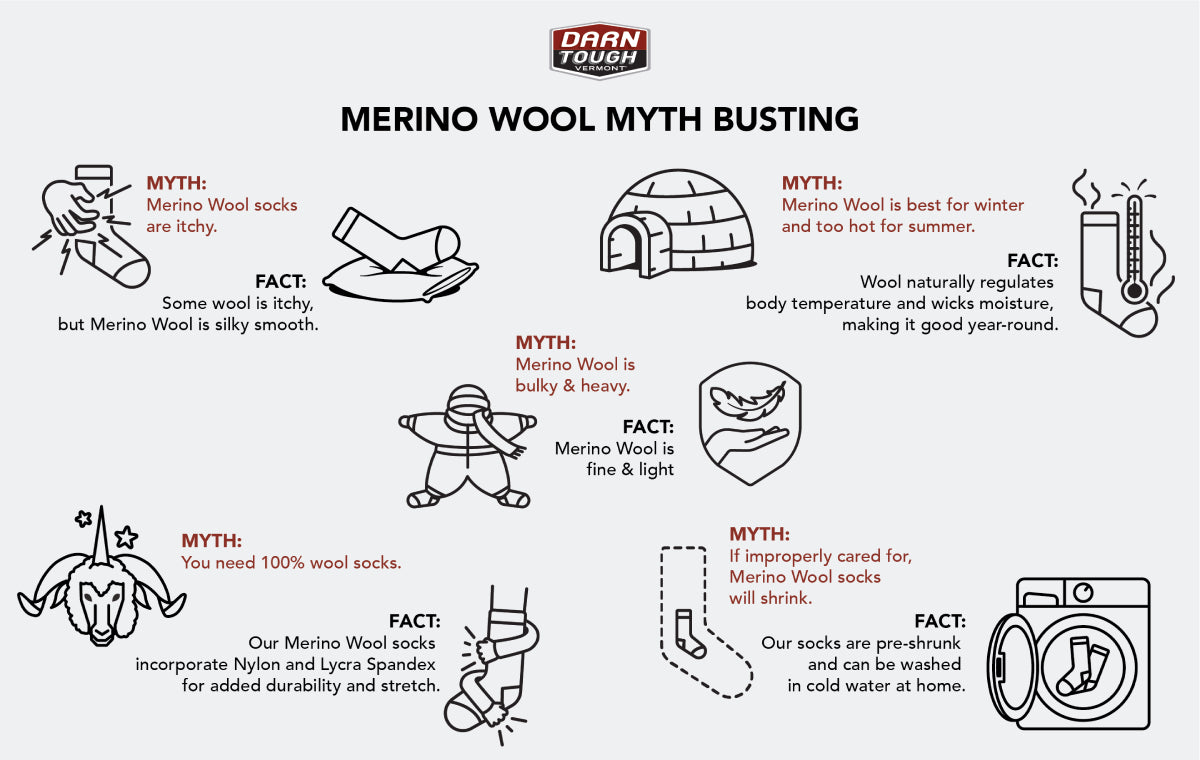5-ish Merino Wool Myths, Debunked

When you’re surrounded by wool day-in and day-out (say, because your job relates to knitting Merino Wool socks), it’s easy to forget that not everyone shares the same wool obsession. And once you know the truth about Merino Wool, that obsession makes sense.
Fact: Merino Wool makes the best performance socks. It’s a fact we’ve tested over and over. We believe it so strongly, we back our socks with a lifetime guarantee that they’ll be the most comfortable, durable, and best-fitting socks you’ve ever owned.
But turns out, despite centuries of use, a lot of people don’t understand Merino Wool. Not pointing fingers, not laying blame at anyone’s feet but our own (sock-clad) soles for not getting the word out there.
Sock puns aside, we take Merino Wool’s reputation seriously. Why don’t more people wear wool socks? We think these common Merino Wool myths have something to do with it.
Less Than a Quarter
Why tackle Merino Wool myths now? We had some questions earlier this year, so we went looking for answers. Those answers came from asking questions, sending out a survey. If you’ve been wearing Darn Tough a while and are an old hat at all things Merino Wool, you might be able to picture our faces when we saw the results.
Of performance sock wearers who took the survey, only 23% chose “made with Merino Wool” as a top driver in their choice. That’s less than a quarter.
Even more eye-opening? 36% chose “made with cotton” as a top driver. Cotton has its place, but performance socks isn’t it. If we look at results from all sock wearers, those numbers become even more drastic, with only 8% choosing "made with Merino Wool."

The survey results weren’t all surprising – turns out most people want comfortable socks that are durable and fit well. Doesn’t hurt if they’re made in the USA and have strong performance benefits. No surprises, we hear you, and will continue to knit accordingly.
What’s surprising is that we know the most comfortable, durable, performance socks are… Merino Wool socks. If you know all this, feel free to head off down a different sock-themed rabbit hole (Are you passionate about socks with sandals? Cushion vs. no cushion?). But if this is news to you, we hope you’ll keep reading.
We didn’t always know about Merino Wool (some of our own once believed these myths). So here’s the most common myths we hear, debunked with what we’ve learned to be true.

Myth 1: Wool Socks Are Itchy
Fact: some wool clothes are itchy. Our grandmas made us sweaters, too. And it’s not just wool. Other clothing materials can cause that itchy feeling. It all comes down to fiber size.
Your skin is sensitive, chock-full of nerves and receptors. When fabric fibers are small, they bend and yield when in contact with your skin. The result? Softness, comfort. But when the fibers are big, they are stiff against your skin instead of supple, causing that itchy, prickly feeling.
Also fact: Merino Wool socks are soft. We knit our socks with high quality Merino Wool. The fibers in our Merino Wool are super small (“superfine” is the technical term). They’re about a third the thickness of a single human hair.
We’re not saying our socks feel like cashmere — but if you think of wool as itchy, your eyes might widen when slipping on a pair of our socks. Even wider if it’s a Twisted Yarn sock, some of our softest socks.

Myth 2: Wool Is Bulky and Heavy
We get it, few people want their clothes to make them into Bibendum (That’s the Michelin Man’s name. True story). And minimizing bulk is vital for performance socks, where you don’t want to negatively impact the fit of your hiking boots, running shoes, ski boots, etc.
Merino Wool might be the most versatile, best sock material we know. We knit with four different yarn weights (yarn weight = yarn thickness), ranging from ultra-lightweight to heavyweight.

The ultra-lightweight and lightweight yarns we use in our Lifestyle and Runner socks are proof of how incredibly thin Merino Wool socks can be. One friend calls the Run No Show Tab “a ghost of a sock.”

And sure, we can knit a thick, cushy sock by using heavyweight yarns and adding some terry loop cushion. Some have compared our full cushion Mountaineering socks to walking on clouds. But Merino Wool yarn is no thick strand you'd find in the crochet basket. You'd likely call it a thread, even our heavyweight yarns.

Myth 3A: Wool Is for Winter; It's Too Hot for Summer
We’ll debunk this wool myth in one (long) word: Thermoregulation. We wrote a whole post explaining what thermoregulation means and how it works, plus another on why Merino Wool is great for summer, but to summarize the main points…
Yes, Merino Wool socks keep your toes warm on cold winter days (Vermont has a lot of those). But the thermoregulating properties that allow Merino Wool to hold in warmth on cold days are the exact same properties that let it release that heat on hot days, actively cooling your feet.

Wearing Merino Wool socks is like giving your feet their own thermostat. Or as one of you put it:
“They kept my feet warm in cold weather and comfy in hot weather. The hot weather comfort was unexpected!” – Carolyn W.
Unexpected, but undeniable. Merino Wool is the true year-round champ.
Myth 3B: Wool Socks Will Make My Feet Sweaty
Fact: Merino Wool helps keep your feet dry, cool, and less sweaty. It’s incredibly breathable.
How do you think sheep do it, running around in the mountains all day straight up covered in Merino Wool? Say it with us… thermoregulation.
The thermoregulation process that keeps your feet warm on cold days, cool on hot days also keeps your feet dry on any day. Merino Wool fibers naturally pull evaporating sweat away from your body, keeping air circulating and dampness at bay.

It may be counterintuitive, but more Merino Wool in your sock can actually mean dryer feet. So don’t be afraid to reach for those midweight socks on a humid summer day.
Myth 4: You Need 100% Wool Socks
We get it, we’ve spent the last 1000 words explaining to you all the reasons Merino Wool is way better than you thought it was. And that’s true. But like all things in life, moderation is key. While a 100% merino wool blanket might be a dream come true, a sock would not be.

We knit our socks with three ingredients: Merino Wool, Nylon, and Lycra®. Why not just Merino Wool? A pure Merino Wool sock wouldn’t have the elasticity needed to hold its fit.
No one wants a sock that’s as un-stretchy and un-fitted as bulky holiday sweater. A touch of Lycra® in the right spots provides arch support and keeps your sock from slipping. Why Nylon? We add it to high-wear zones for extra durability where it’s needed most.

Combine these three simple ingredients and you end up with a high performance, comfortable, durable sock.
Myth 5A: Merino Wool Socks Shrink
Maybe you’re not worried about wool itching or being sweaty. But you are worried your socks will enter the washing machine one size and come out two sizes smaller.
Good news: our Merino Wool socks aren’t going to shrink on you. We wash all our socks before they leave Vermont, so they’re pre-shrunk and clean.

Now, you may notice your socks feel a little tighter after being washed. Like how a pair of jeans feels smaller after you wash them then they stretch back out, our Merino Wool socks go through the same fabric recovery process. With a little bit of wear, the socks will relax.
Myth 5B: You Have to Handwash Merino Wool Socks
You can handwash them, if you want to. If you’re in the backcountry for an extended trip and decide to wash them, handwashing is the only option we know. Might be some pride in a backcountry wash making them true mountain socks. But no, you do not have to handwash our socks. We sure don’t. Every Darn Tough sock has been machine washed and dried before you even put it on.
That said, to get the most out of your socks, we do recommend using your machine’s gentle cycle or wool cycle.

Best practice? Machine wash your Merino Wool socks inside-out in cold water on the gentle cycle. Do not use bleach. Tumble dry on low or hang dry. You can read detailed sock washing instructions, including tips for cleaning them in the backcountry.
One thing you shouldn’t do? Dry clean them. Merino Wool fibers are full of natural benefits, and dry cleaning can damage those fibers.
Merino Wool Might Be Magic
We’re not saying it is, but we’re also not saying it isn’t. If debunking these Merino Wool myths has awoken the Merino Wool obsession in you, check out our list of 5-ish reasons Merino Wool socks are the best.
TL;DR
Are Merino Wool socks itchy?
No, Merino Wool’s superfine fibers mean it feels silky, not itchy. We’re not saying it’s cashmere, but the softness of our Merino Wool socks is a far cry from those itchy sweaters your grandma knit.
Is Merino Wool good for summer?
Yes! Part of what makes this natural fiber so amazing is its temperature regulation (aka thermoregulation). On hot summer days, Merino Wool socks will keep your feet cool.
Is Merino Wool good for winter?
You bet. The same thermoregulation that makes Merino Wool great for hot days also keeps your feet warm on cold days. The fiber’s natural crimp creates warm air pockets to protect your body temperature.
Does Merino Wool shrink? Can you wash and dry Merino Wool?
If you follow the care instructions for your Merino Wool clothing, it shouldn’t shrink. And Darn Tough socks are all pre-shrunk before they leave Vermont, so you don’t have to worry about throwing them in the washer and dryer (though we do have recommend following these easy care tips).
Are Merino Wool socks good for sweaty feet?
Merino Wool socks might just be the best socks for sweaty feet. Merino Wool has excellent moisture management. When your feet sweat, our socks will absorb the moisture (keeping things dry) then vent it away. This also helps with odor resistance, another feature of sweat-prone toes.
Is 100% Merino Wool good? Are there 100% Merino Wool socks?
We only use 100% Merino Wool yarns for top-notch performance and the best quality, but we strategically knit those Merino yarns with other supporting materials, namely Nylon and Lycra Spandex. We aren’t saying 100% Merino Wool is always the wrong choice, but when it comes to socks, you want the increased durability and performance fit that these three materials achieve together.







